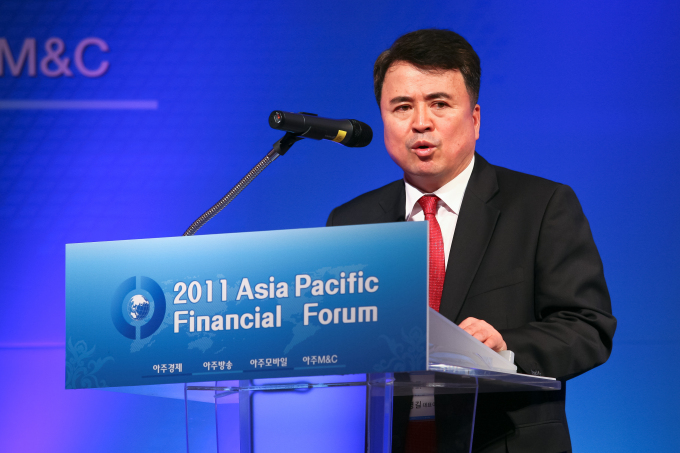 |
| Kwak Young-kil, President of Aju News Corporation, delivers an opening remark at Asia Pacific Financial Forum 2011 at Plaza Hotel, central Seoul on March 30. |
Asia Pacific Financial Forum 2011, kicked off its three-day run on Wednesday to focus on the recent natural disaster occurred in Japan, financial markets in Asia Pacific region, and the future global financial plans at Plaza hotel in central Seoul.
Seoul's the Asia Business and Hong Kong's Wenweipo are co-hosting this forum.
Ministry of Strategy and Finance, Financial Services Commission and Financial Supervisory Service along with Bank of Korea, Korea Institute of Finance have supported the academic event.
"I am looking forward to promoting academic development by holding this forum and I wish peace and prosperity in Asia-Pacific region. I hope this forum will be very successful," Kwak Young-kil, President of Aju News Corporation said.
The event began with congratulatory speeches delivered by Park Hee-tae, speaker of the National Assembly, and Yoon Jin-sik, GNP lawmaker.
Park emphasized on the importance of this forum that the leading Asian markets such as South Korea, Japan and China to seek cooperation to develop the global financial roles.
Participants and economic experts discussed a wide range of topics with the following presentations;
“Global Financial Regulatory Reform and Asian Perspective”, “Global Currency War” as well as “American Quantitative Easing and Global Monetary Perspectives.”
Paul Bloxham, HSBC's chief economist for Australia and New Zealand, gave a special lecture on the asset price bubbles.
He emphasized the fact that interest rates needed to be increased immediately for Asian countries to reach the neutral rate and relieve pressure in markets.
"Quantitative easing or lower interest rates help growth in the regions they are applied to, but the problems which may occur with these actions have yet to be determined for Asian companies," he said.
Bloxham emphasized that the adjustment of capital outflows and inflows and real exchange rate to maintain the proper level, and the need for them to occur.
Shin Je-yoon, Deputy Minister for International Affairs, Ministry of Strategy and Finance, delivered a speech under the title of "Global Financial Regulatory Reform and Asian Perspective". He introduced results of G-20 Summit last year and advised on effective counterplans for Asian financial markets.
Ahn Choong-yong, chairman of the Regulatory Reform Committee, delivered a lecture on global financial crisis and the financial agenda of East Asian countries.
"Through the major financial crisis which occurred in 1997 to 1998 in Asia and the recent global crisis from 2008, I came to this conclusion; the biggest problem that caused the global financial crisis is the lack of international monitoring system rules/regulations on mega financial institutions and international cooperation, especially the trade between their main headquarters and the branches were misled due to lack of regulations which caused many problems,”he said.
Dilip K. Das, a professor at SolBridge International School of Business, gave a speech about financial and regulatory reforms.
The professor told that the global financial crisis made it obvious that financial institutions need; to have more capital, higher liquidity, better risk management, and less leverage.
The second day will focus on the strategies for sustainable development in Asia Pacific financial market and Chinese property market.

